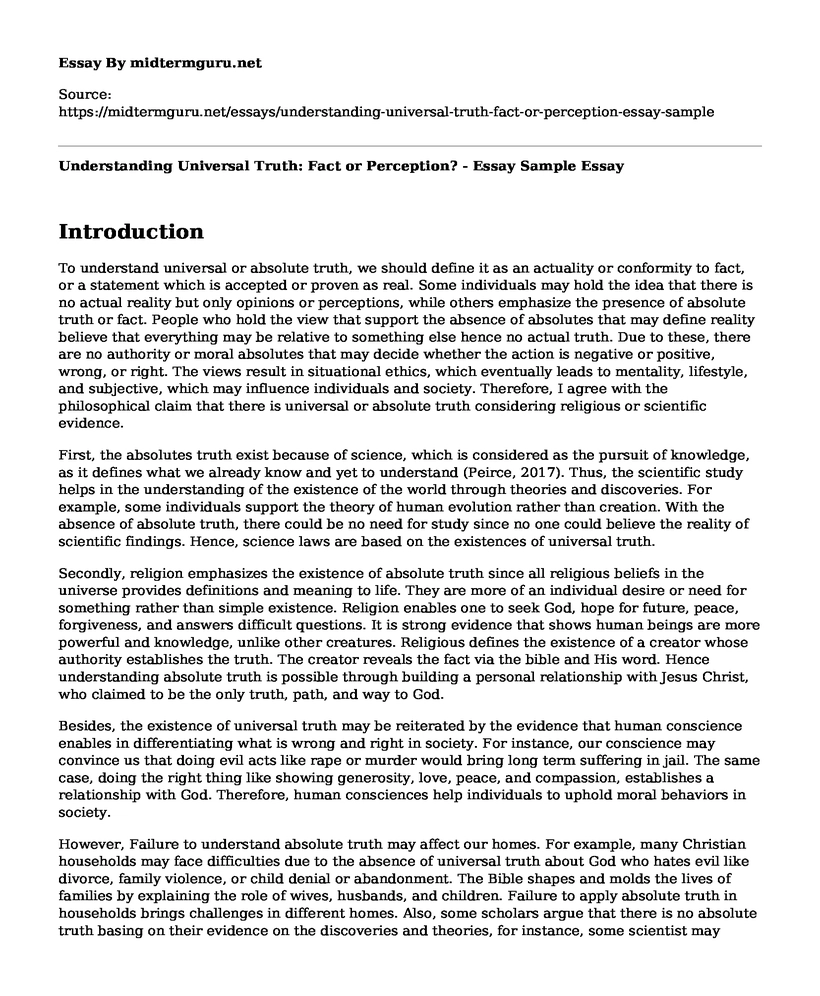Introduction
To understand universal or absolute truth, we should define it as an actuality or conformity to fact, or a statement which is accepted or proven as real. Some individuals may hold the idea that there is no actual reality but only opinions or perceptions, while others emphasize the presence of absolute truth or fact. People who hold the view that support the absence of absolutes that may define reality believe that everything may be relative to something else hence no actual truth. Due to these, there are no authority or moral absolutes that may decide whether the action is negative or positive, wrong, or right. The views result in situational ethics, which eventually leads to mentality, lifestyle, and subjective, which may influence individuals and society. Therefore, I agree with the philosophical claim that there is universal or absolute truth considering religious or scientific evidence.
First, the absolutes truth exist because of science, which is considered as the pursuit of knowledge, as it defines what we already know and yet to understand (Peirce, 2017). Thus, the scientific study helps in the understanding of the existence of the world through theories and discoveries. For example, some individuals support the theory of human evolution rather than creation. With the absence of absolute truth, there could be no need for study since no one could believe the reality of scientific findings. Hence, science laws are based on the existences of universal truth.
Secondly, religion emphasizes the existence of absolute truth since all religious beliefs in the universe provides definitions and meaning to life. They are more of an individual desire or need for something rather than simple existence. Religion enables one to seek God, hope for future, peace, forgiveness, and answers difficult questions. It is strong evidence that shows human beings are more powerful and knowledge, unlike other creatures. Religious defines the existence of a creator whose authority establishes the truth. The creator reveals the fact via the bible and His word. Hence understanding absolute truth is possible through building a personal relationship with Jesus Christ, who claimed to be the only truth, path, and way to God.
Besides, the existence of universal truth may be reiterated by the evidence that human conscience enables in differentiating what is wrong and right in society. For instance, our conscience may convince us that doing evil acts like rape or murder would bring long term suffering in jail. The same case, doing the right thing like showing generosity, love, peace, and compassion, establishes a relationship with God. Therefore, human consciences help individuals to uphold moral behaviors in society.
However, Failure to understand absolute truth may affect our homes. For example, many Christian households may face difficulties due to the absence of universal truth about God who hates evil like divorce, family violence, or child denial or abandonment. The Bible shapes and molds the lives of families by explaining the role of wives, husbands, and children. Failure to apply absolute truth in households brings challenges in different homes. Also, some scholars argue that there is no absolute truth basing on their evidence on the discoveries and theories, for instance, some scientist may prove the reason why they don't believe in God based on approaches of human evolution (Kramer, 2015). Also, the issues of self-contradiction can lead many people to make a negative statement which denies absolute truth. For instance, a person may conclude that there is no God through scientific knowledge about the beginning and the end of the world. Therefore, I agree with philosophy view that there is absolute truth since many people conform to what is right in society.
References
Kramer, F., (2015). Between absolute truth and multiperspectivity: New students' orientations towards science, with a focus on students of educational sciences. Enculturation and development of beginning students, 105.
Peirce, C. S., (2017). Chance, love, and logic: philosophical essays. Rou
Cite this page
Understanding Universal Truth: Fact or Perception? - Essay Sample. (2023, Jan 14). Retrieved from https://midtermguru.com/essays/understanding-universal-truth-fact-or-perception-essay-sample
If you are the original author of this essay and no longer wish to have it published on the midtermguru.com website, please click below to request its removal:
- Ethics in Social Science - Paper Example
- Essay on Significance of Muhammad in Renewal of Islam in Modern Egypt
- Essay on Functions of the Buddha in Buddhism
- Interpretation of Joshua Chapter 4 - Paper Example
- Just War and Jihad - Essay Sample
- Ethics & Equity in Health Care: Tracking Policy Agenda - Essay Sample
- Utilitarianism Case Study







